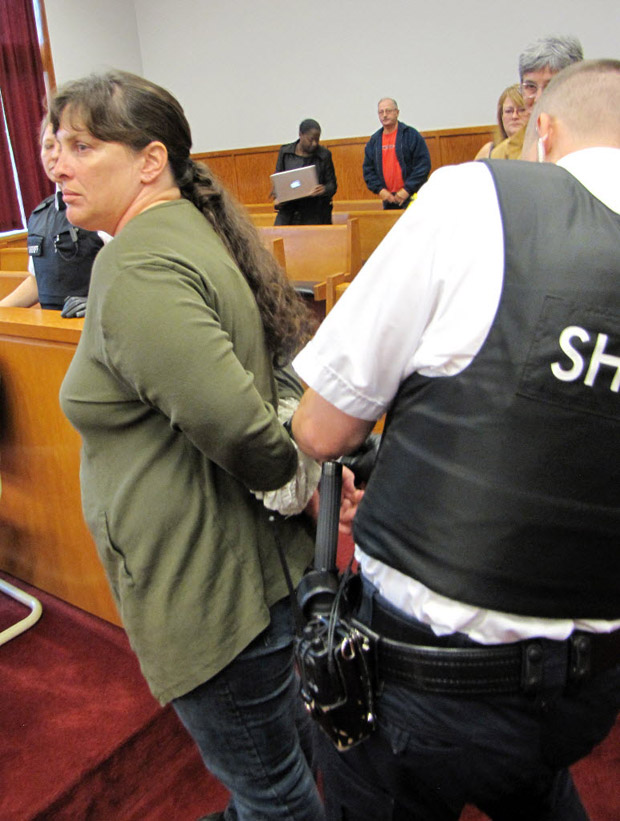Mary Beth Harshbarger’s impressive farmhouse in rural Pennsylvania is filled with trophies from her many hunting trips – bearskins, wildcats, deer heads and caribou antlers.
There’s also a stone bench built in tribute to her husband, Mark, who Harshbarger shot and killed on a hunting holiday in Newfoundland four years ago.
On Friday, a Newfoundland judge will announce whether Harshbarger, 45, is guilty of criminal negligence causing death, for shooting her husband and claiming afterwards she thought he was a bear.
The verdict follows nine days of emotional testimony in Grand Falls-Windsor, N.L., where Harshbarger, and her estranged Pennsylvania in-laws, broke down while watching a police video played in court of Mark’s body, lying face-up in the forest clearing, with a bullet hole ripped through his abdomen.
"I’ll always feel that Mark was murdered," said his father, Lee Harshbarger, in an interview this week.
The Harshbarger family, including three of Mark’s siblings, has insisted for years the shooting was deliberate. They say Mary Beth is an experienced hunter and an expert markswoman who knew precisely what she was looking at that day, in the telescopic crosshairs of her .30-06 rifle.
The family says Mary Beth showed little remorse after the shooting. It also says Mark’s oldest brother, Barry, who was on the fatal hunting trip, divorced his own wife following Mark’s death and now lives in his brother’s home, in a romantic relationship with Mary Beth.
Mary Beth also collected a $550,000 life insurance policy on her husband after successfully suing two insurance companies for the cash.
Whatever the outcome of her criminal trial, that money is hers to keep.
In a Pennsylvania television interview in May, Mary Beth denied killing her husband for insurance money. She said she loved and missed Mark, and dismissed his family’s claims as nothing but "lies" and "small-town talk."
The bizarre case has not only torn Mary Beth from her two young children following her extradition to Canada this spring, it has also torn apart the wider Harshbarger family.
"I lost my son, Mark, and I haven’t had a relationship with my grandchildren or my son, Barry, ever since he went with Mary Beth," says Lee, a retired conservation officer with the Pennsylvania Game Commission. "It’s been unbelievably difficult. It’s ripped our whole family apart."
In the weeks after Mark’s death, RCMP officers in Newfoundland accepted Mary Beth’s claims that the shooting was a tragic accident.
She was sitting in the back of a Chevy pickup with her children at her side and armed with a rifle, on a logging road on the evening of Sept. 14, 2006, waiting while Mark and a local hunting guide walked through the nearby spruce woods in the hopes of flushing out a black bear.
At the time, Barry was at a hunter’s blind, elsewhere in the forest.
The sun had already set, and as Mark and the guide walked back toward the truck, the guide stopped to urinate in the woods. Mark wandered ahead of him, in dark clothing, without an orange hunting hat or vest. As he emerged from the clearing, Mary Beth told police she saw a dark shape that she believed was a bear, and fired.
The guide, Lambert Greene, said Mary Beth became hysterical after Mark was gunned down, saying over and over, "I shot my love, I shot my husband."
Police re-enacted the scene using the same rifle scope, testifying at the trial they could not clearly make out the figure of a man, walking in the twilight at the spot where Mark was killed.
"It is plausible that she mistook (her husband)," testified RCMP Cpl. Doug Hewitt, adding also that "it was too dark to be shooting a firearm."
Despite the RCMP’s initial feeling that no crime had occurred, the Harshbarger family pleaded with police to reconsider.
Two years later, a pair of Mounties travelled to Pennsylvania and interviewed dozens of people who knew Mary Beth. In April, 2008, they charged her with criminal negligence causing death and began extradition proceedings to bring her back to Canada.
Karen O’Reilly, the Crown prosecutor in the case, won’t discuss why murder charges weren’t laid.
At the trial, O’Reilly said Mary Beth’s decision to pull the trigger on an object she may not have clearly identified proved, if nothing else, a "heedless" disregard for public safety.
Her defence lawyer said the shooting was a "horrific" accident, but not a crime.
"I think the verdict could go either way," says Lee Harshbarger. "There’s strong evidence for a conviction, but the defence attorney did a heck of a job. So I don’t know. It’s all up to the judge."
If convicted on Friday, Mary Beth faces a sentence of four years to life in prison.

- Air Canada denies world-renowned musician from boarding flight with cello
- Canada Post strike: Ontario utilities warn of penalties as millions await bills
- ‘We need to make a deal,’ Ford says after Trump responds to energy threat
- Doug Ford threatened to stop energy exports to the U.S. How would it work?







Comments